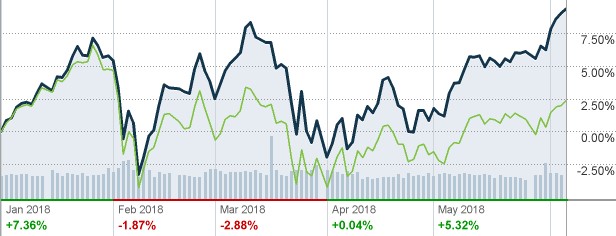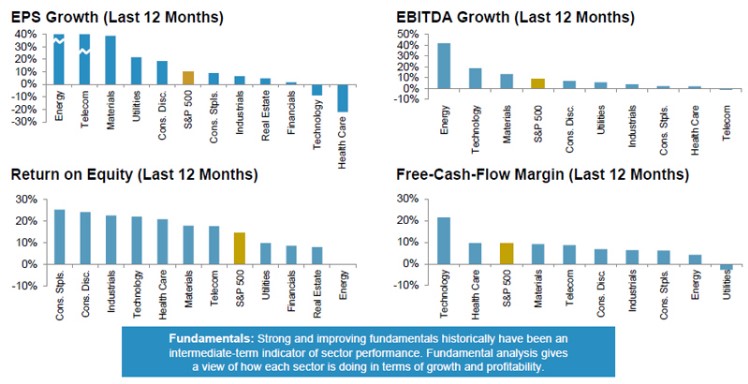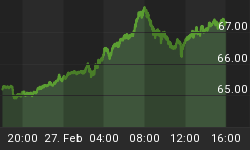About two months ago, one of stocks' biggest bulls gave a rallying call for investors to become bolder and trust growth stocks more.
Blackstone's Joseph Zilde spoke to CNBC's Futures Now where he said that investors had become overly cautious and were giving growth stocks a wide berth, yet most global market fundamentals remained in the pink of health.
Well, it appears that investors sat up and listened. Growth investing appears to be back in vogue, with the tech-heavy Nasdaq Composite (COMP) recently climbing to a new all-time high of 7,652.

(Click to enlarge)
Source: Google
The Nasdaq Composite comprises more than 2,500 stocks that are traded on the Nasdaq Exchange.
Historically, the Nasdaq tends to have a larger share of speculative stocks than the S&P 500, including heavy-hitters like FANG stocks as well as a slew of biotech and other growth stocks.
Over time, Nasdaq Composite tends to grow faster than the broad-market S&P 500, though on the flip side it also tends to be more volatile.
The Nasdaq Composite has comfortably outperformed the S&P 500 in the year-to-date with a return of 10.9 percent vs. 3.2 percent and also over the long-term with a five-year return of 123.52 percent vs. 70.12 percent.
Nasdaq Composite (COMP) vs. S&P 500 (SPX) YTD Change

(Click to enlarge)
Source: CNN Money
Tech Rules
Unlike the S&P 500, whose membership comprises the largest companies in 11 different sectors, the Nasdaq Composite is very tech-heavy with about half of its constituents being technology companies.
And with tech fundamentals currently looking quite good with strong EBITDA and cash flow growth, the index is likely to continue taking out new highs.

(Click to enlarge)
Source: Fidelity Investments
Just like the SPDR S&P 500 ETF (SPY), which tracks the S&P 500, there are several ETFs that track the Nasdaq Composite that investors can buy. These include:
#1 Powershares QQQ ETF(QQQ)
AUM (Assets Under Management): $62.82 billion
2018 YTD Performance: 12.2 percent Related: Silver Stocks Continue To Struggle
QQQ, or Qubes of you like, is an index fund that tracks the Nasdaq 100, which in turn is made up of the largest non-financial companies listed on Nasdaq. Its internal rules skew heavily in favor of the tech sector, with nearly 60 percent of its portfolio dedicated to the Information Technology sector. Qubes is a heavily traded ETF with good volumes. The heavy exposure to tech stocks though tends to make the ETF highly volatile.
#2 Fidelity Nasdaq Composite Index ETF(ONEQ)
AUM: $1.71 billion
2018 YTD Performance:11.23 percent
If you want an index that is more representative of the Nasdaq Composite, then ONEQ makes the cut. About 80 percent of the fund's holdings are Nasdaq Composite stocks with 97 percent of the ETF's holdings being domestic companies. ONEQ is not as tech-heavy as Qubes with its portfolio consisting of tech, healthcare and consumer discretionary stocks.
If index funds are not your cup of tea, here are some top-performing ETFs that will give you good exposure to the tech sector:
#3 Vanguard Information Technology Index Fund ETFs (VGT)
AUM (Assets Under Management): $18 billion
2018 YTD Performance: 14.82 percent
VGT is a low-cost tech ETF with a low management expense ratio of just 0.1 percent. It's also a highly liquid ETF, meaning you not only get tight spreads but also get out when you want. VGT lacks exposure to Amazon and Netflix though.
#4 iShares PHLX Semiconductor ETF(SOXX)
AUM (Assets Under Management): $1.8 billion
2018 YTD Performance: 14.27 percent
Related: Facebook’s War On Propaganda
SOXX is a popular tech ETF with heavy exposure to the semiconductor sector. Some of its top holdings include Intel Corp.(NASDAQ: NVDA) Nvidia Corp.(NASDAQ:NVDA), Qualcomm Inc. (NASDAQ:QCOM) and Micron Inc. (NASDAQ:MU). The semiconductor sector tends to be highly cyclical with boom and bust cycles. This is clearly reflected in SOXX's performance.
#5 PureFunds ISE CyberSecurity ETF (HACK)
AUM (Assets Under Management): $1.56 billion
2018 YTD Performance: 21 percent
HACK is one of the better performing ETFs this year. It gives broad exposure to cybersecurity stocks, which happens to be a red-hot sector with the rapid rise in cybercrime.
By Alex Kimani for Safehaven.com
More Top Reads From Safehaven.com
















